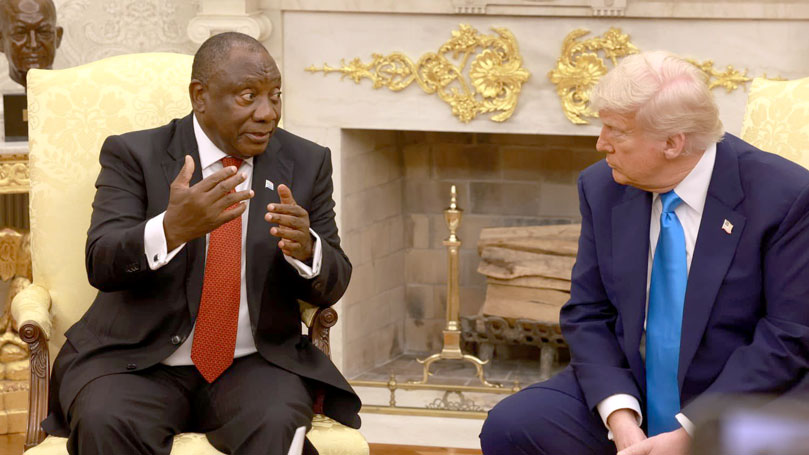
On May 21, a bizarre meeting took place in the Oval Office of the White House in Washington D.C.
President Trump, hosting a visiting South African delegation headed by South Africa’s president, Cyril Ramaphosa, and including several members of Ramaphosa’s cabinet as well as other South African dignitaries, suddenly went into attack mode and began to berate his guests with utterly false information about a supposed “genocide” being perpetrated against white Afrikaner farmers in South Africa. Trump’s evidence for this long discredited accusation included an audiovisual show of a massive number of white crosses along a South African highway, which Trump claimed represented thousands of murdered white farmers. He also handed Ramaphosa a thick sheaf of internet printouts which supposedly documented the “genocide,” and a video clip of Julius Malema and other members of the out-of-government opposition party, the Economic Freedom Fighters, singing the militant anti-apartheid chant “Dubul ibhuno,” i.e. “Kill the Boer.”
The evidence Trump presented was nonsense, and easily refuted by the South Africans, including Agriculture Minister Mr. J.H. Steenhuisen, himself an Afrikaner from the conservative Democratic Alliance party. The white crosses were a memorial for two farmers who had been murdered, and not “thousands,” as Trump implied. A printout of an article showing corpses being buried was not from South Africa, but rather depicted the aftermath of a massacre which took place in Goma, Democratic Republic of the Congo, after Rwanda-supported insurgents took control of that city. And Malema and the Economic Freedom Fighters are strident opponents of Mr. Ramaphosa’s government, not part of the country’s ruling coalition.
So Trump was just being the Trump we know.
But immediately after that dumpster fire of a meeting, there was another, closed meeting between the two presidents. The theme of that second meeting was serious stuff, negotiations about trade, tariffs, and the like.
Serious stuff indeed. South Africa has vast mineral riches including gold, diamonds, platinum, and other things. It is subsaharan Africa’s most developed country. And with 64 million inhabitants, it is a good sized market. On the negative side, it has problems maintaining its infrastructure. One of the major reasons that President Ramaphosa’s African National Congress, which had ruled South Africa since liberation from apartheid in 1994, lost its parliamentary majority in the 2024 general elections and felt forced into a very ungainly coalition, was that there were major electrical blackouts all over the country that year.
Prior to that election, the South African government was based on the Tripartite Alliance of the African National Congress (ANC), the South African Communist Party (SACP), and the Congress of South African Trade Unions (COSATU). Now Ramaphosa has to deal with coalition partners in his cabinet and in parliament who are anti-communist and anti-labor. Not only agriculture minister Steenhuisen, but also the Minister for Communications and Digital Technologies, Solomon Malatsi, belong to the Democratic Alliance Party, which favors neoliberal policies.

Enter South Africa–born Elon Musk, who attended the White House extravaganza.
Musk has a company called SpaceX, which includes a branch called Starlink. Starlink is a huge operation which provides online access via thousands of small, low orbit satellites. As of 2024, 130 countries are hooked up to Starlink — but not the Republic of South Africa. Musk would like to get into the potentially lucrative South African market, but he regards South Africa’s affirmative action policy called Broad Based Black Economic Empowerment, or BBBEE, to be an obstacle to be overcome. BBBEE requires that foreign companies which wish to be licensed to operate in South Africa commit to including 30% of their shares in the country to members of previously excluded groups, with some room to negotiate other solutions to the country’s development needs. That would certainly require that Starlink and Musk to negotiate with the South African government on the matter. But Musk claims that the whites, not the Blacks, are now the excluded or oppressed group in South Africa. This is one of the reasons he has promoted the idea of an anti-white genocide existing in South Africa, as well as the exaggerated accusations that the government wishes to seize white people’s land without compensation.
This situation has left many people in South Africa wondering what, exactly, was agreed to in the closed, second meeting at the White House. Voices have been raised within the Tripartite Alliance, within the ANC and in the wider society, asking whether perhaps the government made undesirable concessions under U.S. pressure, precisely on the issue of BBBEE.
The Congress of South African Trade Unions (COSATU) has issued a sharply worded statement on the subject. COSATU, says the statement, favors foreign investment that will create much needed job opportunities in South Africa, where the level of unemployment among Black workers is around 43%. But such investment must adhere to the stipulations of South African law, and not be based on “social media incitement by right wing cranks and race baiting hustlers” such as AfriForum.
It looks, from a statement made by Communications and Technologies Minister Solomon Malatsi, as if the government might be under pressure to make concessions to Starlink that are in the interests of the company and Musk, but not of the South African people, at least in the eyes of COSATU and other people in the ANC and beyond.
This is indeed how transnational monopoly capitalism and imperialism work, all over the world.
Workers and people of good conscience in the United States need to be aware of this situation. We know firsthand what acceding to the demands of people like Trump and Musk is doing to us. We need to be ready to fight against what they are trying to do to the people of South Africa, and other countries as well.
The opinions of the author do not necessarily reflect the positions of the CPUSA.
Image: South African President Cyril Ramaphosa meets with Trump in the Oval Office by GovernmentZA on Flickr (CC BY-ND 2.0); Union members in South Africa protest against companies violating the country’s labour laws by Mukurukuru Media (Facebook)


 Join Now
Join Now